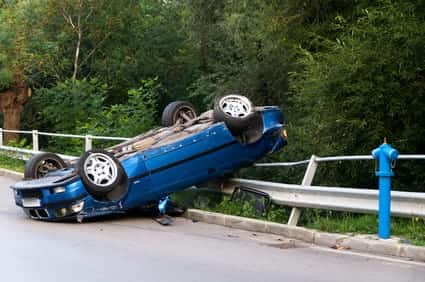The extreme forces unleashed in rollover car accidents in West Virginia mean victims often suffer catastrophic, life-altering injuries. When other drivers or inherently unsafe vehicles are to blame, victims should not be left to pick up the pieces alone. Instead, they could be entitled to substantial compensation for their medical bills, lost income, pain, suffering, and more.
Were you hurt in a rollover collision in West Virginia that wasn’t your fault? The attorneys from Robinette Legal Group, PLLC, want to help you demand the money you deserve from the people responsible for your losses. Our prior experience in insurance defense gives us considerable insight into how adjusters and defense lawyers fight accident claims to save insurers’ money – insight we can use to develop an aggressive legal strategy tailored to the facts of your case.
Are you ready to demand justice and accountability from the people who hurt you? Contact Robinette Legal Group, PLLC, today to speak with a West Virginia rollover accident lawyer about your case. The initial consultation is free. We won’t charge you a fee unless we recover money on your behalf.
Most Common Causes of Rollover Car Accidents
Rollover car accidents often occur due to initial collisions, driver errors, poor vehicle design, or mechanical failures that lead to loss of control. Some of the most frequent causes of rollover accidents in West Virginia include:
- Speeding
- Reckless driving, including swerving through traffic at a high speed
- Improper lane changes
- Taking corners too fast
- Overcorrecting when the vehicle drifts out of its lane
- Drowsy driving
- Driving under the influence of alcohol or drugs
- Distracted driving
- Road hazards, including black ice, snow, standing water, or potholes
- Inadequate vehicle maintenance or defective car parts that lead to brake failures, tire blowouts, or steering malfunctions
- Running off the road and down an embankment
Injuries Sustained in Rollover Accidents
What happens to your body in a rollover accident? As the car flips or tumbles over, your body may violently jostle around the passenger cabin, potentially striking the sides or roof or being hit by loose items. As a result, you may sustain serious rollover accident injuries, such as:
- Severe lacerations or abrasions
- Degloving injuries
- Dislocated joints
- Ligament sprains and tears
- Muscle or tendon strains and tears
- Whiplash
- Nerve injuries
- Herniated spinal disc injuries
- Spinal cord injuries and paralysis
- Internal injuries and bleeding
- Broken bones
- Facial injuries, including eye injuries
- Traumatic brain injuries
- Amputation
Rollovers have a high risk of causing head, neck, spinal, and brain injuries, as car occupants often hit their heads on hard surfaces of the car’s interior as the vehicle tumbles.
Who Is at Fault in a West Virginia Rollover Car Accident?
Although rollover accidents are frequently the fault of negligent motorists, other parties might also be to blame. For example, if a car suffered a rollover due to a blowout of a defective tire, the car’s manufacturer or the tire company may be liable for the resulting injuries and damage.
To identify the parties at fault for a West Virginia rollover car accident, an attorney will need to review considerable evidence, which might include:
- Police accident reports
- Accident scene photos and videos
- Surveillance camera, traffic camera, or dashcam footage
- Data from car electronic control modules or event data recorders
- Eyewitness testimony
- Post-accident vehicle inspections
- Car maintenance records
- Driver cell phone records
- Accident reconstruction or engineering expert reports
What To Do After a Rollover Car Accident
The shock of being in a rollover crash can make it hard to think about what you need to do to recover. However, you can take steps after a rollover accident to protect your health and your legal rights to pursue a compensation claim. These include the following:
- Report the accident to law enforcement and obtain a copy of the police accident report.
- Seek medical attention to diagnose injuries you have suffered in the accident.
- Follow your doctor’s recommendations and treatment plan for your injuries.
- Request copies of medical records for your injury treatment, as these can establish the extent and nature of your injuries as well as the cost of treating them.
- Gather receipts, bills, and invoices for expenses you had because of the accident.
- Collect your pay stubs to determine your lost earnings caused by your injuries.
- Contact a rollover accident lawyer at Robinette Legal Group, PLLC, as soon as possible to find out if you could be owed compensation and to begin pursuing it.
Compensation Available in Rollover Accident Claims in WV
A rollover accident attorney from Robinette Legal Group, PLLC, can aggressively pursue maximum compensation for your losses, which could include:
- Medical treatment and rehabilitation expenses, including hospital stays, surgeries, doctor’s appointments, pain medication, physical therapy, and occupational therapy
- Costs of long-term care you may need for permanent disabilities that result from your injuries
- Past and ongoing losses of income if you cannot work or earn less due to your injuries or disabilities
- Pain and suffering
- Emotional trauma and distress
- Reduced enjoyment and quality of life caused by disabilities, permanent scarring, and disfigurement
- Vehicle repair costs and related expenses, such as car rental fees or reimbursement for the value of your totaled vehicle
Our experienced car accident attorneys are standing by to review your case to determine the extent of your losses and begin pursuing the compensation you could be owed.
Talk to an Experienced Rollover Accident Lawyer in West Virginia Today
Were you hurt in a rollover car accident in West Virginia? If someone else was to blame, you deserve to pursue financial recovery for your injuries and losses. Let a trusted attorney with Robinette Legal Group, PLLC, fight hard on your behalf, so you can focus on resting and recovering from your injuries.
Contact us today for a free, no-obligation consultation to learn how a West Virginia rollover accident lawyer from our firm can help you seek maximum compensation for all your accident-related losses. We have the experience and proven record of success needed to help you achieve your best possible result.
This article was previously published in June 2021 and updated for relevance in August 2023.
Call us today to find out how we can help you.


Car Accident Injuries
Jeff Robinette was hired by a young woman who had sustained permanent injuries to her foot due to an auto collision. The insurance company offered such a small amount and dealt with her in such a dismissive manner that the treatment of her case amounted to bad faith on the insurance company’s part. Jeff was able to obtain a substantial settlement which allowed this young woman and her husband to pay medical bills, buy a car and a home, and start building a future together.
Drunk Driver
While driving his car, our client was hit by a drunk driver which injured his shoulder so severely that three surgeries were required. The insurance company haggled over the value of the claim, initially giving a low-ball offer. Jeff Robinette was able to force the insurance company to pay all insurance available for this claim.
Brain Injury
While timbering in WV, a heavy equipment operator sustained a permanent brain injury while performing the duties of his job. What price can you put on the loss of a fully functioning, fully reasoning brain? Jeff Robinette was able to negotiate a settlement that was annuitized to provide for this man for the rest of his life.
Our Awards and Certifications












Practice Areas
- Personal Injury Overview
- Bicycle Accidents
- Brain Injuries
- Burn Injuries
- Car Accidents
- Commercial Delivery Truck Collisions
- Construction Site Injuries
- Defective Product Injuries
- Dog Bite Injuries
- Drunk Driver (DUI) Accidents
- Gas Explosion Injuries
- Insurance Claim Disputes
- Mining Accident Injuries
- Motorcycle Accidents
- Pedestrian Accidents
- Rear-End Collisions
- Scaffold & Ladder Fall Injuries
- Slip And Fall Accidents
- Spinal Cord Injuries
- Truck Accidents
- Uninsured Motorists
- Work Accidents
- Wrongful Death




